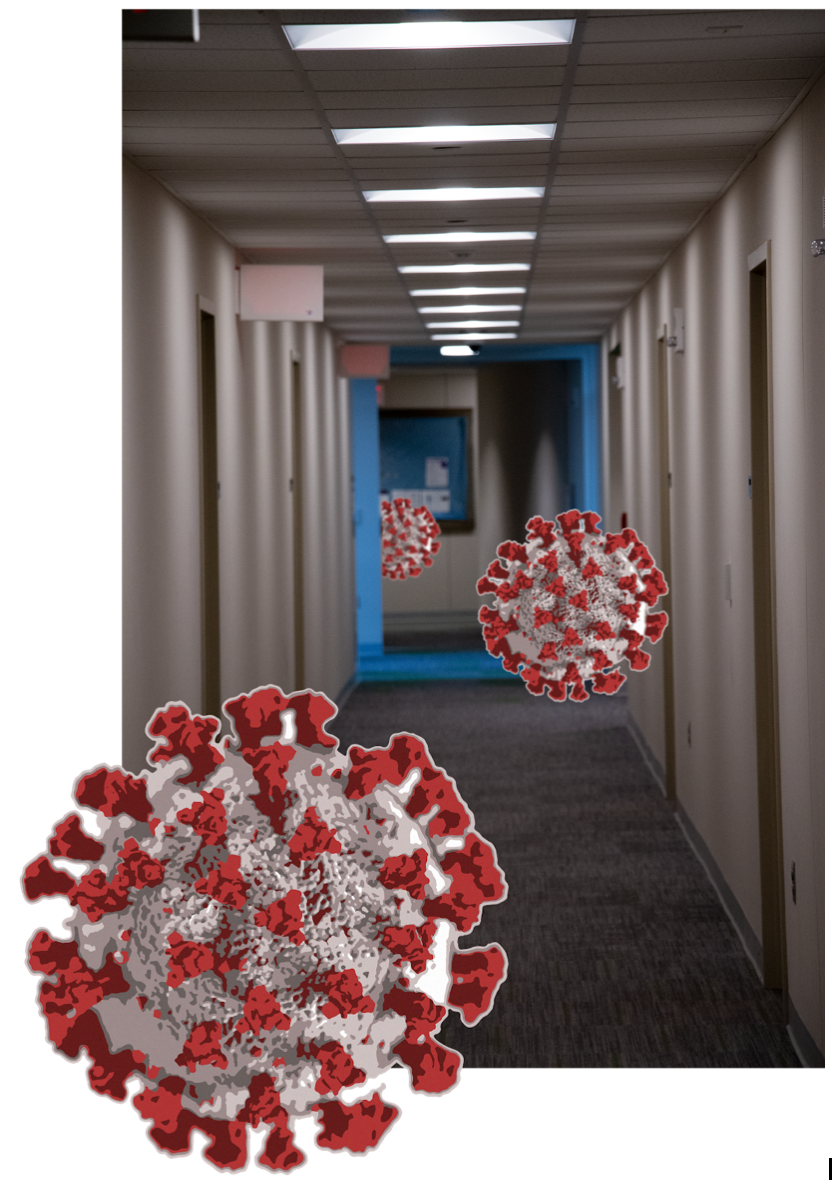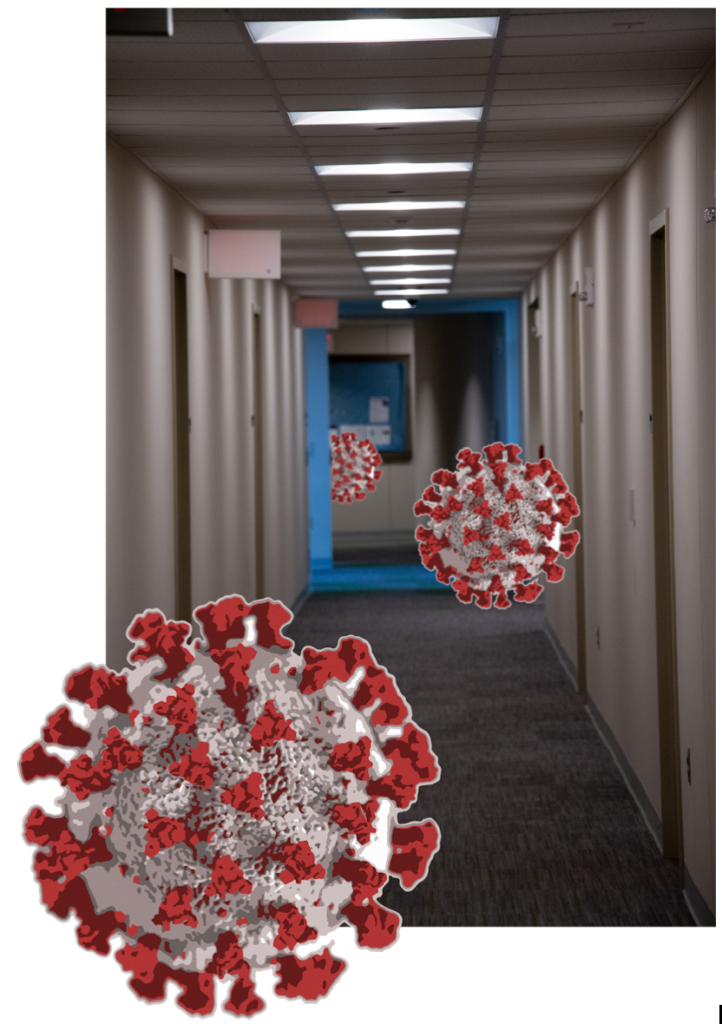
By Charles Wilson
Multimedia Editor
As the spike of COVID-19 cases skyrocketed on campus in late October, the need to clean isolation areas became more and more apparent, but that meant custodians would have to enter bathrooms and common areas of buildings where positive cases were waiting out their isolation and quarantine. The pandemic rages on, and the luxury of “going virtual” can be impossible for a significant portion of jobs in America. On-campus, custodial staff not only can’t work remotely but have to venture into buildings with a dense student population. A few of these custodians have volunteered to work in a residence hall with positive cases of COVID-19. Graham Lebel, chapter chair of the Saint Michael’s College custodial workers’ union, is one of a few who did so.
“I volunteered because I felt I was low risk enough for it to be safe,” said Lebel. “I am 41 and don’t have any health issues that would make me higher risk.” But that doesn’t mean he isn’t concerned about exposure. His concerns surrounding COVID-19 mainly involve his wife and three-year-old son, and his mother, who takes care of his son three times a week. “Since the outbreak, I no longer enter my mom’s house when I drop him off,” Lebel said. “I’ll probably be extra careful at least until 14 days after Thanksgiving.”
“The original plan was to not clean isolation areas,” said Lebel. “I believe the assumption was that the population in isolation would be small enough that we could get away with not cleaning the area.” With a semester total of 79 positive cases, nearly five percent of the undergraduate population, that became unrealistic. “The amount of trash generated by takeout containers alone made cleaning necessary,” Lebel said.
Armed with his N95 mask and gloves provided by the college, Lebel cleans Joyce Hall during a designated hour when students are required to stay in their rooms. Since COVID travels through the air, it’s important that there is as little contamination as possible. “The students are supposed to stay in their rooms, but this does not always happen,” Lebel said.
The college has put notable effort into helping the custodial workers according to Jim Durkin, Communications Director for AFSCME Council 93. They’ve cooperated with the union representing them, AFSCME Council 93, which has been working across New England to secure benefits for the people they represent.
“The college has been extremely helpful and cooperative throughout the pandemic,” said Jim Durkin, noting that even with a decrease in hours during the lockdown, custodians received full pay. “The college did what they could to keep income steady for these workers.”
The union also requested that all the quarantined students be housed in one residence hall, which the college agreed to. “I’m told that the director of facilities, Joel Ribout, has been great about listening to our concerns and has worked closely with us to address any COVID-related issues as they come up,” Durkin said, noting that these concerns include accommodating flexible hours for people with childcare issues.
To enter these buildings more safely, custodians need to use Personal Protective Equipment such as an N95 mask and gloves. “They’ve done a solid job making sure that we have access to adequate PPE,” Durkin explained.

It’s unclear whether hazard pay would offer more for the custodial workers as a whole or if the workers who volunteer to clean quarantine buildings would receive higher pay than those who don’t, but regardless the inclusion of hazard pay at all would be a good gesture from the college. Unfortunately, due to complications with stimulus packages and qualification restrictions, Saint Mike’s hasn’t secured a stimulus package since the CARES act in April. AFSCME Council 93 has been at the forefront of advocating for hazard pay and, in many cases across New England, has delivered. For the college to award hazard pay to their custodians, they would have to qualify for further stimulus money.
We asked you on Instagram if you think custodial staff working in quarantine and isolation buildings should receive hazard pay, and almost 97% of you answered yes. “If they aren’t, that’s ridiculous,” said one anonymous response. The state and federal government are the only things standing between a stimulus package and the custodian’s hazard pay, but in the wake of the 2020 presidential election, tensions are higher than ever.
“From a practical standpoint, we should certainly qualify. We were exposed to one of the biggest outbreaks in Vermont and it was entirely predictable,” said Lebel regarding hazard pay.
The option to test externally using the health insurance provided by the college’s employees is an option, but sometimes an unrealistic one. Transportation, availability, and external responsibilities are some of the many reasons why external testing could be difficult. “I reached out to the SGA president [about custodial staff being tested for COVID] and the response wasn’t necessarily urgent,” said Lena O’Donnell, a member of the Student Labor Action Movement, or SLAM. “It didn’t really seem like the custodial staff and their safety was an issue.”
Maddi Sousa, the President of SLAM, added “To say that custodians can just ‘go off-campus’ on their own free time and get tested assumes that they don’t have another job, that they have the transportation to get there, that they have the resources to get there and know where to go. It’s adding a lot more responsibility on their part when really they’re doing the most for us and we’re giving them nothing back.”
Vanessa Bonebo, the SGA president, clarified that her response wasn’t meant to convey a lack of urgency. She and others at the college recognize the need for on-campus testing, but the Broad Institute simply wasn’t able to take on the additional tests for staff members, including custodial staff. This issue has been confirmed to be a priority for the college, as both Bonebo and Joel Ribout, Director of Facilities, made it clear that the college is hard at work to address the issue. “Details of that have not been worked out yet, but they are being actively discussed,” said Ribout.
While Lebel may not be at high risk for complications, he is indirectly in contact with people who are. “I do not regret volunteering,” said Lebel, “but my hope is that the college will offer voluntary testing for staff in the future. My biggest fear is that I will get COVID-19, but be asymptomatic and spread it to my three-year-old son, who could then be asymptomatic and spread it to my mom or his pre-school.”

